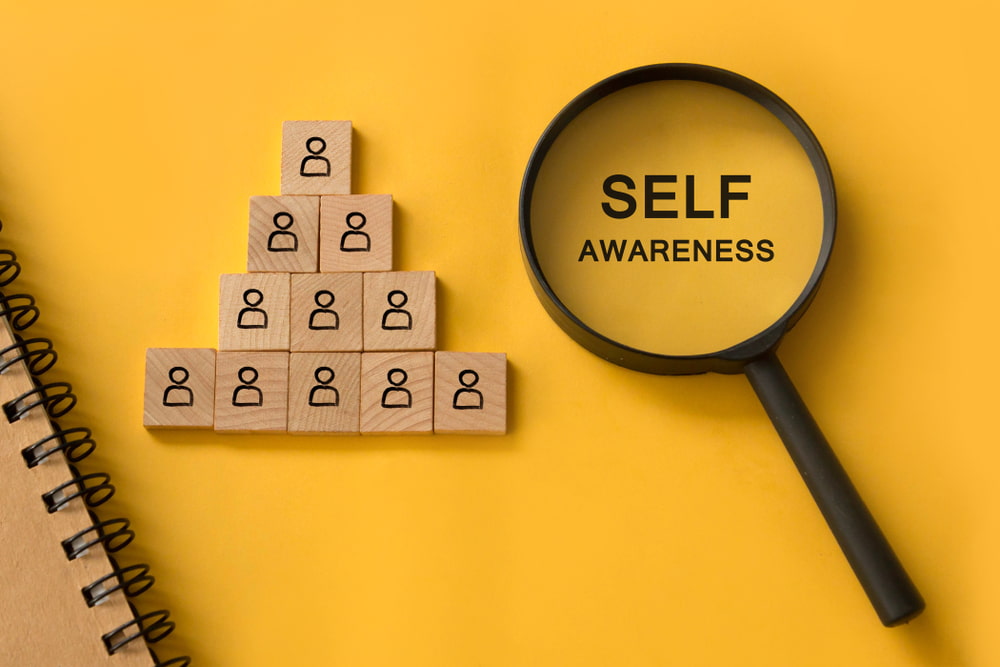It becomes oh so easy to allow your own self-awareness to be on the back burner and end up focused on everyone else except yourself. Many of us spend time perceiving ourselves through the eyes of our friends, family, society, and romantic partners that we forget to look deep inside ourselves. We externalize our worth and hand it to others to confirm if we are worthy/enough.
Self-awareness and accountability can help us to achieve healthier relationships. It can open the door to building strong intimacy in a relationship. The more familiar we are with our true selves, the deeper we can introspect, the more open we can become.
Take some time to take a look at yourself through the lens of what we call the Whole Perspective. How do you feel about and see yourself physically, mentally, financially, intellectually, and emotionally? Try to see yourself for who you truly are, with all the imperfections and perfections you have. Begin the road to heightened self-awareness by learning more about it.
What Is Self-Awareness?

In general terms, self-awareness is our ability to see ourselves for who we truly are. It’s our capability to peer into the deepest parts of what makes us who we are. Understand our innermost characteristics, desires, needs, and wants, and also our insecurities, faults, and imperfections.
However, there is another type of self awareness – external self-awareness. This allows us to fully understand how other people perceive us after acquiring a more detailed perception of ourselves. The more we learn about ourselves, the more we understand how others see and understand us.
In relationships, both these separate categories of self-awareness are what allows us to communicate with our partners openly and honestly. By knowing who we are and who our partner thinks we are, we open both ourselves and our relationships to new opportunities. And there’s no downside to that with the people we love.
Why Are The Archetypes Of Self-Awareness?
Based on the two separate types of self-awareness, there are four archetypes of self-awareness. Both internal and external self-awareness can be high and low. From there, the four archetypes are:
- Introspectors: This archetype is characterized by high internal and low external self awareness. It is indicative of individuals who are aware of who they are, yet don’t tend to step out of their comfort zone and inquire about feedback from others.
- Seekers: Seekers have low internal and external self-awareness and have trouble determining who they are, what they stand for, and where they’re going in life and in relationships.
- Pleasers: Pleasers have high external and low internal self-awareness, which can lead them to focus on trying to appeal to others and overlook themselves and their own personality in the process.
- Aware: Aware individuals have high internal and external awareness, they know who they are and what others might think of them.
Successfully determining whether you have high or low self-awareness, and attempting to pinpoint which archetype you are is one of the important first steps in raising your self-awareness and improving your relationship interactions.
What Are The Signs Of Low Self-Awareness?
Low self-awareness can negatively affect your romantic relationships and other parts of your life. Not knowing the depth of your own personality can lead to insecurities, frustration, and inability to form a functioning and dedicated relationship with your partner. Determining whether your self-awareness is low can help you and the people around you.
Common Signs Of Low Self-Awareness

Here are some of the most common signs of low self-awareness:
- Trouble understanding your different emotions
- Shutting down people who question your beliefs
- Making excuses for your own failures and failings
- Experiencing difficulty empathizing with others
- Inability to adequately explain certain actions toward others
- Suppressing your negative emotions
- Setting unrealistic expectations for yourself
- Lacking a sense of true identity and purpose
- Struggling with self-control and time management
It’s easy to get discouraged and feel hopeless when taking a look at the common telltale signs of low self-awareness. However, there’s nothing to be ashamed of and you’re not to blame. Starting on the path to self-awareness can be tough, scary, and filled with questions, however it’s a journey well worth the effort in the end.
How Do I Develop My Self-Awareness?
If you’ve determined that your self-awareness is not that high, you can begin to build it now! If you manage to improve your metacognition, you can experience a whole-life transformation in numerous areas. You will:
- Start enjoying a more open and fulfilling romantic relationship
- Improve your daily moods
- Clear your mind and enhance your decision making
- Become a more effective communicator
- Boost your productivity
How To Improve Self-Awareness

Explore some of the ways that might help you discover more about yourself:
- Try to pay more attention to both your feelings and the feelings of people around you.
- Start reading high-quality fiction that focuses on both the intrapersonal and interpersonal.
- Attempt to identify your emotional block and the reasons behind it causing unfavorable emotions.
- Ask those closest to you for feedback and try to take it well and constructively.
- Try to identify your own cognitive distortions.
- Clarify the values you stand behind and the reasons for them.
- Work on your behavioral patterns and emotions with experienced coaches.
And remember – the road to self-awareness can be long and difficult. Attaining it, however, opens up a whole new world of emotional possibilities that can improve your life and your relationships with others, including your romantic partner.
PIVOT’s Emotional Intimacy Coaching Can Help You Develop Self-Awareness And Build Intimacy
Self-awareness can help you enjoy a healthier, more loving, caring, and supportive relationship with your partner. Also, it can help you prevent some of the common problems that arise in relationships, such as constant emotional projection and the appearance of various defense mechanisms on your part.
However, it’s important to emphasize one thing – low self-awareness is not your fault, and it’s not something you need to continually blame yourself for. It’s not easy to become aware of and control the deepest depths of your personality. Making the first step toward resolving such issues is brave and very rewarding in the end.If you need assistance raising your self awareness, PIVOT is here to help you in any way we can. Our thoughtful relationship coaches organize introspective and curative individual workshops, as well as caring and invigorating retreats for couples. We want to see your relationship grow and your mutual affection thrive. Reach out to us today!